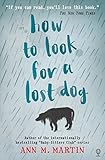
Price: £30.81
Publisher: Usborne Publishing Ltd
Genre: Fiction
Age Range: 10-14 Middle/Secondary
Length: 234pp
Buy the Book
How to Look for a Lost Dog
Rose is 12, though most of her classmates in the 5th Grade at Hatford Elementary School in New York State are only 10. That’s because ‘no-one is sure what to do with me in school. I’ve stayed back for two semesters, which is a total of one year’. Four pages in, Rose tells us her ‘official diagnosis is high-functioning autism, which some people call Asperger’s syndrome’. Readers might well have recognised this already, since we have seen how absorbed and excited Rose is by homonyms – Rose/rows, grown/groan, or even better wrapped/rapped/rapt – recording them meticulously on a treasured list. She loves numbers too, especially prime numbers; when things distress her, she’s learned to call out a sequence – two, three, five, seven, eleven, thirteen and so on, until she’s restored order to chaos. Her need for structure requires rules, and everyone around her must stick to them too.
Her father Wesley is a threatening presence in the novel’s short cast list. Her mother, he says, abandoned Rose. His own childhood was harsh – he and his gentle brother Weldon, who lives nearby, were fostered by seven different families before he’d turned 18. There’s little cash around, and even less when Wes is fired from his job as a garage mechanic; much of what money’s left is drained away at The Luck of the Irish bar. For all Wes’s good intentions to be a better father than his own, living with Rose pushes him close to violence. The novel carries more conviction because Wes is not an outright villain, but he’s no listener, and since the kids in Rose’s class find it hard (or funny) to listen to her too, it’s just as well that Uncle Weldon reads Rose with love and patience.
One wet night, Wes tries to do something good for his daughter. He brings Rose a gift – a stray dog. Rose names her new friend Rain (reign/rein) and she becomes an anchoring certainty for Rose. Life at school includes adults who try their best to support her within a mainstream class; and when Rain follows Rose into school one day to the delight of the other kids, they understand Rose more clearly too. In her daily contact with Uncle Weldon, there is empathy and nurture. This equilibrium is shattered, however, on the night when Hurricane Susan ravages Hatford. Wes lets Rain outside and she doesn’t come back. Rose’s well-planned search is successful, only for her to discover that Rain’s original owners have also been found; their home has been swept away and all the family, adults and children, are desperate to reclaim their lost pet – they need something good to happen. What must Rose do?
This is a moving story which will surely attract many readers, maybe adults as well as children – Rose is engaging as well as vulnerable and her unusual vision of the world is sustained throughout. Despite the novel’s apparent simplicity, readers must employ a dual perspective, drawn into the story through Rose’s narrative while standing back to evaluate her understanding of events. (Readers might well be reminded of Mark Haddon’s The Curious Incident of the Dog in the Night-time.) But my considerable pleasure in the story was shadowed by the issue of authenticity. In a Note, Ann M. Martin mentions spending a morning at a school for students on the Autism Spectrum (one morning?); and she asked the school’s director to read her manuscript. The familiar question is, How successfully has the writer become an ‘insider’? It’s an old question – as old as wondering whether Dickens could characterise young women. White author/black protagonist? Straight author/LGBT characters? And so on. I realise writers differ in their abilities to inhabit ‘other’ perspectives; but while some fictions can draw upon daily experience (in the matter of gender differences, say), other areas such as disability are more problematic for both writers and readers. For example, I’m not knowledgeable enough about autism to judge how accurate Rose’s narrative voice is. BfK readers might like to google ‘disabilityinkidlit.com’ and references to Rain/Reign (the book’s original US title) to find critical and reflective reactions, including contributions from a father reading the story to his autistic son and two published authors who describe themselves as autistic.



